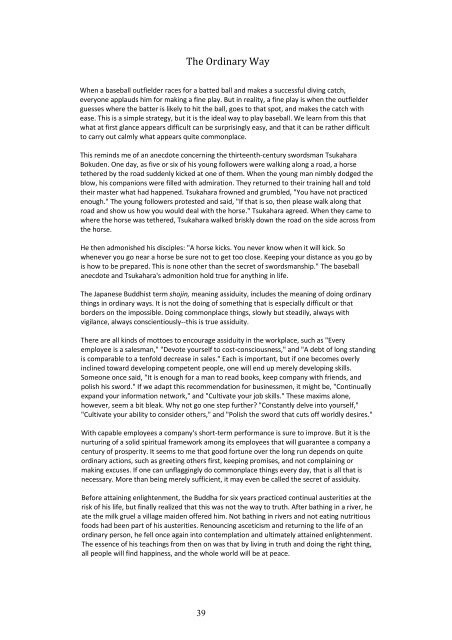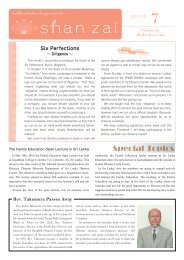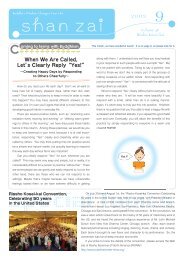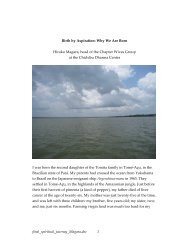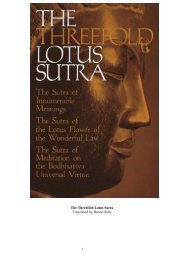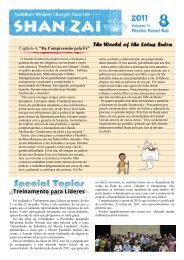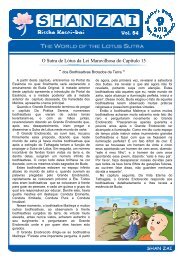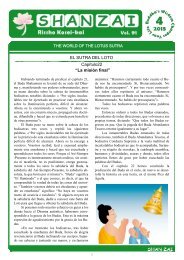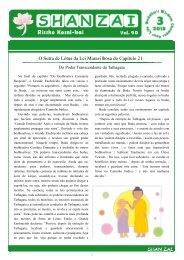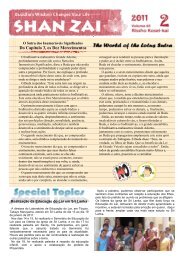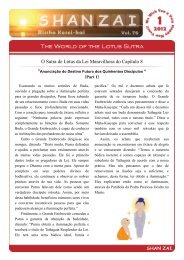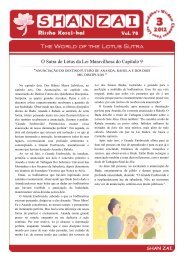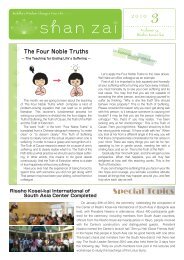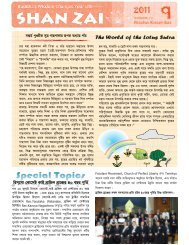Create successful ePaper yourself
Turn your PDF publications into a flip-book with our unique Google optimized e-Paper software.
The Ordinary WayWhen a baseball outfielder races for a batted ball and makes a successful diving catch,everyone applauds him for making a fine play. But in reality, a fine play is when <strong>the</strong> outfielderguesses where <strong>the</strong> batter is likely <strong>to</strong> hit <strong>the</strong> ball, goes <strong>to</strong> that spot, and makes <strong>the</strong> catch wi<strong>the</strong>ase. This is a simple strategy, but it is <strong>the</strong> ideal way <strong>to</strong> play baseball. We learn from this thatwhat at first glance appears difficult can be surprisingly easy, and that it can be ra<strong>the</strong>r difficult<strong>to</strong> carry out calmly what appears quite commonplace.This reminds me of an anecdote concerning <strong>the</strong> thirteenth‐century swordsman TsukaharaBokuden. One day, as five or six of his young followers were walking along a road, a horsete<strong>the</strong>red by <strong>the</strong> road suddenly kicked at one of <strong>the</strong>m. When <strong>the</strong> young man nimbly dodged <strong>the</strong>blow, his companions were filled with admiration. They returned <strong>to</strong> <strong>the</strong>ir training hall and <strong>to</strong>ld<strong>the</strong>ir master what had happened. Tsukahara frowned and grumbled, "You have not practicedenough." The young followers protested and said, "If that is so, <strong>the</strong>n please walk along thatroad and show us how you would deal with <strong>the</strong> horse." Tsukahara agreed. When <strong>the</strong>y came <strong>to</strong>where <strong>the</strong> horse was te<strong>the</strong>red, Tsukahara walked briskly down <strong>the</strong> road on <strong>the</strong> side across from<strong>the</strong> horse.He <strong>the</strong>n admonished his disciples: "A horse kicks. You never know when it will kick. Sowhenever you go near a horse be sure not <strong>to</strong> get <strong>to</strong>o close. Keeping your distance as you go byis how <strong>to</strong> be prepared. This is none o<strong>the</strong>r than <strong>the</strong> secret of swordsmanship." The baseballanecdote and Tsukahara's admonition hold true for anything in life.The Japanese Buddhist term shojin, meaning assiduity, includes <strong>the</strong> meaning of doing ordinarythings in ordinary ways. It is not <strong>the</strong> doing of something that is especially difficult or thatborders on <strong>the</strong> impossible. Doing commonplace things, slowly but steadily, always withvigilance, always conscientiously‐‐this is true assiduity.There are all kinds of mot<strong>to</strong>es <strong>to</strong> encourage assiduity in <strong>the</strong> workplace, such as "Everyemployee is a salesman," "Devote yourself <strong>to</strong> cost‐consciousness," and "A debt of long standingis comparable <strong>to</strong> a tenfold decrease in sales." Each is important, but if one becomes overlyinclined <strong>to</strong>ward developing competent people, one will end up merely developing skills.Someone once said, "It is enough for a man <strong>to</strong> read books, keep company with friends, andpolish his sword." If we adapt this recommendation for businessmen, it might be, "Continuallyexpand your information network," and "Cultivate your job skills." These maxims alone,however, seem a bit bleak. Why not go one step fur<strong>the</strong>r? "Constantly delve in<strong>to</strong> yourself,""Cultivate your ability <strong>to</strong> consider o<strong>the</strong>rs," and "Polish <strong>the</strong> sword that cuts off worldly desires."With capable employees a company's short‐term performance is sure <strong>to</strong> improve. But it is <strong>the</strong>nurturing of a solid spiritual framework among its employees that will guarantee a company acentury of prosperity. It seems <strong>to</strong> me that good fortune over <strong>the</strong> long run depends on quiteordinary actions, such as greeting o<strong>the</strong>rs first, keeping promises, and not complaining ormaking excuses. If one can unflaggingly do commonplace things every day, that is all that isnecessary. More than being merely sufficient, it may even be called <strong>the</strong> secret of assiduity.Before attaining enlightenment, <strong>the</strong> Buddha for six years practiced continual austerities at <strong>the</strong>risk of his life, but finally realized that this was not <strong>the</strong> way <strong>to</strong> truth. After bathing in a river, heate <strong>the</strong> milk gruel a village maiden offered him. Not bathing in rivers and not eating nutritiousfoods had been part of his austerities. Renouncing asceticism and returning <strong>to</strong> <strong>the</strong> life of anordinary person, he fell once again in<strong>to</strong> contemplation and ultimately attained enlightenment.The essence of his teachings from <strong>the</strong>n on was that by living in truth and doing <strong>the</strong> right thing,all people will find happiness, and <strong>the</strong> whole world will be at peace.39


